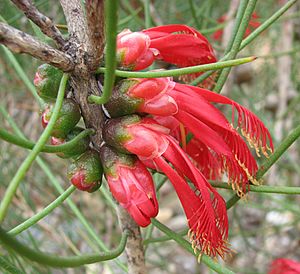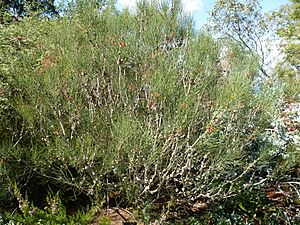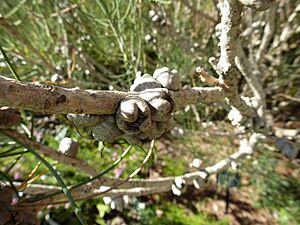Calothamnus gilesii facts for kids
Quick facts for kids Calothamnus gilesii |
|
|---|---|
 |
|
| Calothamnus gilesii in the Royal Botanic Gardens, Cranbourne | |
| Scientific classification |
|
| Kingdom: | Plantae |
| Clade: | Tracheophytes |
| Clade: | Angiosperms |
| Clade: | Eudicots |
| Clade: | Rosids |
| Order: | Myrtales |
| Family: | Myrtaceae |
| Genus: | Calothamnus |
| Species: |
C. gilesii
|
| Binomial name | |
| Calothamnus gilesii |
|
| Script error: The function "autoWithCaption" does not exist. | |
| Synonyms | |
|
Melaleuca gilesii (F.Muell.) Craven & R.D.Edwards |
|
Script error: No such module "Check for conflicting parameters".
The Calothamnus gilesii is a unique plant. It belongs to the Myrtaceae family, which is the same family as myrtle trees. This plant is special because it is endemic to the south-west of Western Australia. This means it naturally grows only in that part of the world.
It's usually a compact shrub that stands upright. It has thin, pine-like leaves. From June to January, it produces bright red flowers that grow in clusters.
What it Looks Like
Calothamnus gilesii is a shrub that can grow up to about 1.5 metres (4.9 ft) tall. It can be upright or spread out. Its leaves are thin and round, like a pipe. They can be up to 120 millimetres (5 in) long and get thinner towards a sharp tip.
The flowers are a bright red color. They grow in small groups on the plant. Inside the flowers, the stamens (the parts that make pollen) are arranged in 5 bundles that look a bit like claws. The plant usually flowers in late spring and summer. After the flowers, it grows woody capsules, which are like small seed pods.
Naming the Plant
The plant Calothamnus gilesii was first officially described in 1876. This was done by Ferdinand von Mueller, who was a government botanist in Victoria. He wrote about it in a book called Fragmenta Phytographiae Australiae.
Scientists are not completely sure who the plant's name, gilesii, honors. It might be named after Ernest Giles, who explored central Australia. Or it could be for Christopher Giles, who was Ernest's friend. Both of them collected plants for Mueller. Mueller noted that "Giles and Young" collected the plant.
Where it Grows
Calothamnus gilesii is found across many dry areas in south-western Western Australia. You can find it in places like the Avon Wheatbelt and the Nullarbor Plain. It also grows in other regions such as Coolgardie and Murchison. This plant likes to grow on sandy plains and rocky ridges.
Is it Protected?
The Western Australian government's department of parks and wildlife has looked at this plant. They have classified it as "not threatened." This means it is not currently in danger of disappearing.
Growing it in Gardens
This plant is also used in gardens. It grows well in tough, hot conditions. It can handle some dry weather and even a bit of frost.
 | William L. Dawson |
 | W. E. B. Du Bois |
 | Harry Belafonte |



